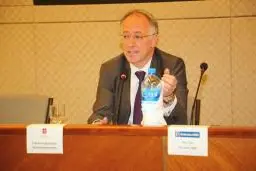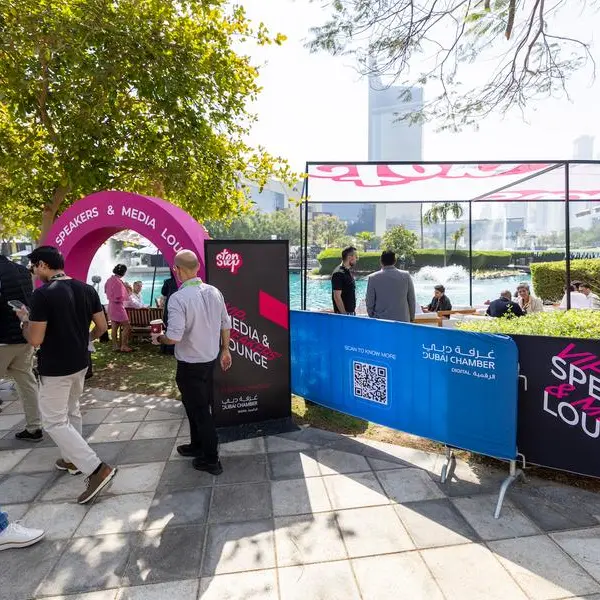PHOTO
Analysts forecast continued spending by Gulf governments despite drop in oil revenues
●Global political calendar forecasted to be less risky than 2014
●Cheap oil to stimulate the global economy
●Emerging Asia grows more than twice as fast as the rest of emerging markets
Kuwait, February 7, 2015: Gulf governments will continue to spend on mega projects, development programs, and social welfare initiatives despite the sharp drop in the price of oil in the second half of 2014, said two leading economists at a seminar hosted by Asiya Investments in Kuwait.
The speakers were Emirates NBD's Head of Research and Chief Economist, Tim Fox and Francisco Quintana, Asiya Investments' Chief Economist. Both Fox and Quintana presented a 2015 outlook for Gulf countries, emerging markets and global growth while taking into account political and economic uncertainties that are expected to influence regional and global economies in the coming year. The session was attended by economists, analysts, and investors.
Both economists said that the non-oil economy in the Gulf will not be affected by global and regional events as it continues to be shielded from the impact of instability in other parts of the Arab World, thanks to continued spending by Gulf governments and the high disposable income of their populations.
And in regards to the oil economy, "there is a consensus that crude oil prices will naturally change directions and begin to gradually increase; an increase that will likely be drastic if political instability increases in certain parts of the Middle East," said Quintana
He added: "Continued geopolitical tensions, social unrest in Egypt after the coming elections, conflict escalation in Libya and Syria, are all potential oil price drivers."
However, even with the unfortunate scenario of unrest continuing in the Middle East, it is very unlikely to see the price of crude oil averaging above USD 80 by year-end, unless one or both of the following two events take place.
The first is negative outcome of negotiations on Iran's nuclear program that are scheduled for Q2 2015 and the second is OPEC members voting to reduce production to boost the price of oil.
On the other hand, low crude oil price could stimulate growth globally and especially in Europe and emerging economies, which now have access to cheaper raw material and logistics costs. Emerging economies will also attract new capital inflows in Asia and other parts of the world," said Emirates NBD's Head of Research and Chief Economist, Tim Fox.
In such an economic environment, all eyes should be on Emerging Asia said Quintana. Emerging Asia is still growing twice as fast as the rest of the world's emerging markets, which themselves are outpacing growth in developed economies by two to one. The GCC is well positioned to benefit from this growth.
Fox added that geopolitical risks govern the region this year and could lead to a contagion to the Gulf countries, affecting tourism in countries such as the UAE and Qatar. Tensions between Qatar and the rest of the Gulf are ongoing within the political front, and political successions in some Gulf countries are also seen as risks that could affect stability. A positive effect of geopolitical risks are further inflows of foreign money into the UAE banking system and ultimately other assets including equities and real estate.
Global growth prospects
Globally, growth is expected to remain at a 3% rate this year, said Asiya Investment's Chief Economist. This growth will be driven by a stronger US economy, Fox believes, with a tighter monetary policy that is expected to be rolled out around the second quarter of 2015. Though a tighter US Federal Reserve policy would mean stronger growth in the US, it would also mean tighter financial conditions for emerging economies leading to capital migration and volatility in these markets, said Fox.
"Unlike most emerging markets, Emerging Asia's growth will remain elevated, in spite of China's deceleration, because India will compensate for it," said Quintana.
In terms of risks, Quintana pointed at that, after January, June-July would be the riskiest moment of the year, as a number of elections (Turkey, UK) coincide with the deadline for the nuclear agreement in Iran, and the debt-ceiling issue in the US.
Having said that, Quintana highlighted that in spite of these indicators, unforeseeable conflicts usually absent from the political calendar could also truly shake the global and Gulf economy.
Overall, both economists portrayed a rather positive outlook for 2015. Both economists saw the price of crude oil gradually climbing from the low USD40 mark reached in January 2015. They did agree that there will be a strain on the budget of Gulf countries but thanks to high cash reserves generated from previous years, spending will continue.
Prior to joining KCIC, Quintana worked as a Senior Advisor to the Deputy Mayor for Economic Affairs and Employment at the City of Madrid. Quintana also worked as an Economist at the World Bank in Thailand and Lao PDR as a Trade and Investment Advisor at the Economic and Commercial Office of the Embassy of Spain in Thailand, and at IBM Spain as a Business Consultant. He holds a BA in Economics from the University of Malaga, an MSc in Development Economics from SOAS and a MPA from IE Business School.
Fox has over 25 years of international experience in financial markets. He has been serving as Chief Economist & Head of Research at Emirates NBD since November 2008. Fox leads the research of economic and financial analysis and reports, with a focus on global and regional economies and financial markets. Prior to joining Emirates NBD, Fox served as Director of FX Strategy at Dresdner Kleinwort in London. He has previously held senior economics and strategy positions at a number of global financial institutions in London and New York, including Credit Suisse and Standard Chartered, where his focus ranged from G10 to emerging market economies. Fox is a graduate of the London School of Economics and Political Science.
-Ends-
About Asiya Investment:
Asiya Investments is a subsidiary of KCIC which was founded by an Emiree Decree with a capital of KD 80 million and a mandate to invest in domestic demand-driven sectors in Asia, namely energy, real estate, healthcare, infrastructure, and financial services. KCIC is the Parent Company of a Group that includes Asiya Investments Dubai Limited and Asiya Investments Hong Kong Limited. Asiya Investments Dubai Limited serves as the investment advisory hub for KCIC. Asiya Investments Hong Kong Limited is fully equipped with a skillful and experienced investment team which has further demonstrated KCIC's commitment to the Asian markets. The publicly-listed Group employs a team of Asia specialists and currently manages assets in excess of a billion. Key shareholders of KCIC include the Kuwait Investment Authority (Kuwait's Sovereign Wealth Fund), National Investments Company (one of the leading investment banks in the Middle East), and Alghanim Industries (one of the largest conglomerates in the Middle East).
About Emirates NBD:
Emirates NBD is a leading bank in the region. The Bank has a leading retail banking franchise, with 224 branches and over 885 ATMs and CDMs in the UAE and overseas. It is a major player in the UAE corporate and retail banking arena, and has strong Islamic banking, investment banking, private banking, asset management, global markets, and treasury and brokerage operations. The Bank has operations in the UAE, Egypt, Qatar, the Kingdom of Saudi Arabia, Singapore, the United Kingdom and representative offices in China, India and Indonesia. For more information, please visit: www.emiratesnbd.com
For more information, please contact:
Leslie Mouawad - Bensirri Public Relations - Mobile: +965 99981334 - Email: leslie@bensirri.com
© Press Release 2015



















